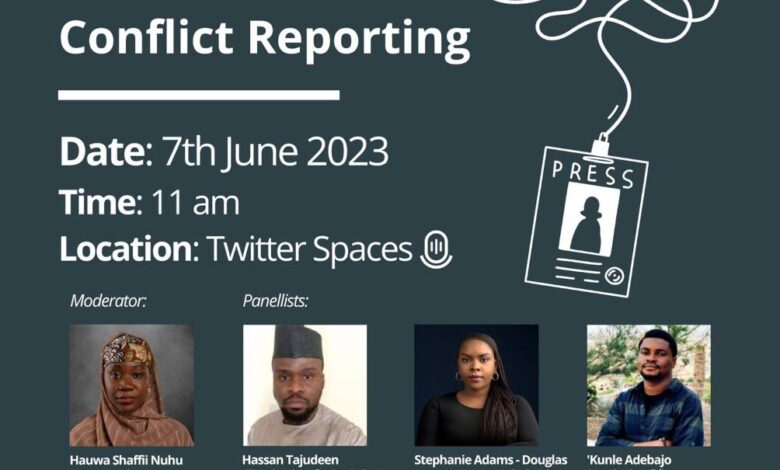HumAngle Hosts Dialogue On Mental Strain Of Conflict Reporting
HumAngle Media recently hosted media practitioners and a psychologist on a virtual dialogue as part of efforts to encourage conversations that highlight the process of conflict reporting.

HumAngle Media hosted media practitioners Stephanie Adams-Douglas, Kunle Adebajo, and psychologist, Dr. Hassan Tajudeen in a virtual discussion on Twitter on June 7th, as part of efforts to encourage dialogues that highlight the process of conflict reporting.
The dialogue, titled ‘Mental Strain of Conflict Reporting’, started off with Kunle Adebajo, the Investigations Editor at HumAngle media, talking about the importance of mental health support to conflict reporters. He explained that people are sometimes more drawn to bad news as opposed to good or lighthearted news because.
He added that the responsibility of bringing such news takes a toll on journalists over time especially because they consume the information in its raw state. “Journalists expose themselves to a lot of trauma; Trauma on the field, trauma from reading documents…they do the hard work of consuming information such that other people don’t have to consume it the same way,” he said. Adebajo also added that a lot of conflict journalists are exposed to videos of people committing suicide, molestation, and even massacres during the research process.
Clinical Psychologist and Head of the recently launched organization, HumAngle Sanctuary, Dr. Hassan Tajudeen, explained that reporters are highly prone to being vicariously traumatised by the level of gruesome details they are exposed to, some more than others depending on each individual’s threshold. He added that there is a need to have more professionals in the field of psychology but even that will not be enough. The first step, he said, is for an individual to recognise that help is needed. Tajudeen explained the importance of early intervention in order to avoid life-altering damage which is an effect of Post Traumatic Stress Disorder (PTSD).
Stephanie Adams-Douglas, the deputy manager for Media Freedom at the Centre for Journalism Innovation and Development (CJID), said there hasn’t been enough mental health interventions for journalists in general and as at 2017, there were no national policies in place to cater to reporters’ mental health. She added that a few years back, CJID expanded its doors to journalists beyond the organisation after it carried out a mental health survey on its staff and realised the extent of the damage.
Adams-Douglas explained that at first, reporters were hesitant to open up when professional help was offered but there was a remarkable change for the better when Group therapy sessions were held. She stated that more can still be done to ensure better mental health help for journalists.
“Every newsroom in Nigeria does have an obligation to invest both time and resources into the mental health of their staff.”
What are the solutions to relieving the mental strain of conflict reporting in Nigeria? Adebajo started off by highlighting the existing unhealthy approach he believes media companies have towards journalism. He mentioned that the glamorisation of hard work only adds to the strain. Media executives need to be more flexible with working hours, he said. He also added that not specialising in a particular field only makes it more difficult because there is a constant need to chase everything newsworthy. Compensation also needs to be improved because even when work breaks are given, some reporters still use the time to freelance rather than truly rest in order to make ends meet.
Although a national mental health bill has been passed into law this year, Adams-Douglas still emphasized the lack of mental health professionals in the country. She added that if there are more professionals in the industry, they will be able to spread awareness a lot better.
Tajudeen stated that accessibility in terms of cost needs to be subsidized by the government in order to make it easier for the general public to get help. He mentioned that “there is increased enlightenment, there is increased awareness about mental health in Nigeria now,” but the government and media need to do a better job at encouraging mental health dialogues.
HumAngle Sanctuary, a HumAngle organization launched recently, also strives to make help more accessible to the public but most importantly, to professionals and victims.
Tajudeen, who heads the organization, says there will be a regular podcast by the Sanctuary where issues affecting conflict reporters and victims of violence will be discussed. There are also plans to pioneer a new route of managing mental health through virtual reality. Community-based advocacy is also in the cards for the organization.
The conversation was moderated by Chigozie Victor, a Gender Reporter and creative writer at HumAngle Media.
Support Our Journalism
There are millions of ordinary people affected by conflict in Africa whose stories are missing in the mainstream media. HumAngle is determined to tell those challenging and under-reported stories, hoping that the people impacted by these conflicts will find the safety and security they deserve.
To ensure that we continue to provide public service coverage, we have a small favour to ask you. We want you to be part of our journalistic endeavour by contributing a token to us.
Your donation will further promote a robust, free, and independent media.
Donate HereStay Closer To The Stories That Matter




